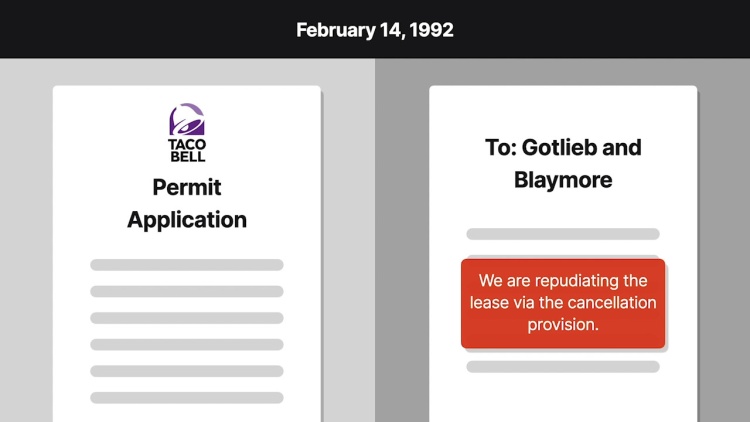Gotlieb v. Taco Bell Corp.
United States District Court for the Eastern District of New York
871 F. Supp. 147 (1994)
- Written by Melanie Moultry, JD
Facts
Gotlieb and Blaymore (plaintiffs) entered into a 20-year lease with Taco Bell Corporation (defendant). The lease provided that: (1) rental payments were to begin on June 15, 1992; (2) Taco Bell was required to pay a monthly base rent, along with additional rent for items such as taxes and utilities; (3) Taco Bell was obligated to obtain permits and approvals for restaurant construction and operation but could cancel the lease if it was unable obtain the permits and approvals by February 15, 1992; and (4) Taco Bell was obligated to pay Gotlieb and Blaymore liquidated damages for breach of the lease terms. Community groups opposed the restaurant’s construction. On February 10, 1992, Taco Bell sent Gotlieb and Blaymore a letter requesting alteration of the lease terms. Taco Bell filed a permit application on February 14, 1992, and sent Gotlieb and Blaymore a letter repudiating the lease on the same date. Gotlieb and Blaymore responded with a letter denying Taco Bell’s request to alter the lease terms, rejecting the repudiation, and stating that Gotlieb and Blaymore would hold Taco Bell liable under the lease. In June 1992, Gotlieb and Blaymore sued Taco Bell for past and future rent, and for acceleration of all future rent due under the lease. Taco Bell refused to pay. During trial, Gotlieb and Blaymore testified that: (1) on October 19, 1993, Gotlieb and Blaymore met with Rite-Aid Corporation representatives to discuss renting the premises, and (2) on November 3, 1993, Gotlieb and Blaymore submitted a proposed lease to Rite-Aid that included higher rental rates than those included in the Taco Bell lease.
Rule of Law
Issue
Holding and Reasoning (Orenstein, J.)
What to do next…
Here's why 907,000 law students have relied on our case briefs:
- Written by law professors and practitioners, not other law students. 47,100 briefs, keyed to 996 casebooks. Top-notch customer support.
- The right amount of information, includes the facts, issues, rule of law, holding and reasoning, and any concurrences and dissents.
- Access in your classes, works on your mobile and tablet. Massive library of related video lessons and high quality multiple-choice questions.
- Easy to use, uniform format for every case brief. Written in plain English, not in legalese. Our briefs summarize and simplify; they don’t just repeat the court’s language.





